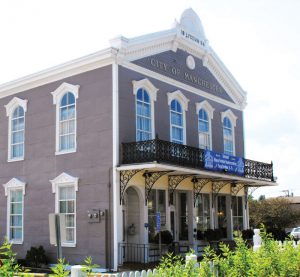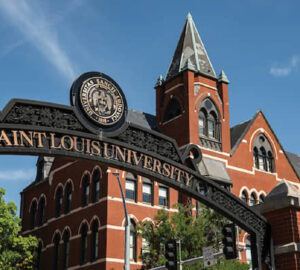 manchester | The historic Lyceum building, built in 1894, is the focal point of the City of Manchester and has served as its city hall since 1979. It’s so distinctive that it’s central to the city’s logo. On the National Register of Historic Places, the iconic two-story gray-and-white Lyceum sits just west of Hwy. 141 and Woods Mill Road, on the south side of, natch, Manchester Road. You’ve probably seen it, maybe marveled at its beauty, while stuck in traffic on the way to Ballwin and back. But it’s become too cramped, even for this smallish suburb of 18,000. The city administration plans to move down the pike a bit into a former Commerce Bank building. The Lyceum started its 19th century service as a tin shop—with a dance hall upstairs. No fooling. The building had many incarnations after the tin shop shuttered, and it served during the last century (the 20th!?) as most everything including a soda shop, movie theater and hardware store, becoming vacant in 1975. The lovely vintage tin ceilings remain. But there’s no elevator for disabled residents, and the Victorian-era windows are, let’s say, quaint. That is, expensive to maintain. Parking is not ideal. This poses an array of problems for the building’s potential uses in the future. Regular readers of this column know that your favorite reporter is fond of roller-disco conversions, as he has proposed for another vacant dinosaur, Chesterfield Mall—hey, boomer! We could even call it 64 West, for old times’ sake. Regardless, whether the Lyceum stays put or has to be moved, the city has its work cut out for it.
manchester | The historic Lyceum building, built in 1894, is the focal point of the City of Manchester and has served as its city hall since 1979. It’s so distinctive that it’s central to the city’s logo. On the National Register of Historic Places, the iconic two-story gray-and-white Lyceum sits just west of Hwy. 141 and Woods Mill Road, on the south side of, natch, Manchester Road. You’ve probably seen it, maybe marveled at its beauty, while stuck in traffic on the way to Ballwin and back. But it’s become too cramped, even for this smallish suburb of 18,000. The city administration plans to move down the pike a bit into a former Commerce Bank building. The Lyceum started its 19th century service as a tin shop—with a dance hall upstairs. No fooling. The building had many incarnations after the tin shop shuttered, and it served during the last century (the 20th!?) as most everything including a soda shop, movie theater and hardware store, becoming vacant in 1975. The lovely vintage tin ceilings remain. But there’s no elevator for disabled residents, and the Victorian-era windows are, let’s say, quaint. That is, expensive to maintain. Parking is not ideal. This poses an array of problems for the building’s potential uses in the future. Regular readers of this column know that your favorite reporter is fond of roller-disco conversions, as he has proposed for another vacant dinosaur, Chesterfield Mall—hey, boomer! We could even call it 64 West, for old times’ sake. Regardless, whether the Lyceum stays put or has to be moved, the city has its work cut out for it.
 ladue
ladue
Starbucks baristas or other employees who work at the area’s busiest store—Clayton and Lindbergh in the plaza where the late, lamented Schneithorst’s Restaurant used to be—are mad as hell and hope they don’t have to take it for much longer. Right as the store manager opened Sept. 24, the crew told him they were taking the day off for a one-day “strike”—that’s in quotation marks because workers at this store are not in a union. But they’d sure like to be, even though unionized Starbucks employees may earn $3 less per hour than non-union employees. My friend Paul (not his real name) had worked at the Ladue store between high-powered sales positions. As Paul papered the Midwest with resumes, he and Georgette had a toddler; Starbucks turned out to be a great gig for a family—for a while. But if Georgette had chosen to work, it would have been a heavy lift for the couple to afford suitable daycare. That isn’t a problem anymore, since Georgette stays home with the little boy and Paul landed an enviable, career-oriented job in medical equipment sales, not to mention he’s honing his invention of a new surgical device. He’s grateful for the time he spent at the world’s largest coffee shop. But that was back in the day when he was among a dozen workers. Another major worker complaint is two-pronged: Starbucks has reduced staffers by about a third and cut hours. This is just another egregious example of a huge corporation taking advantage of low-wage workers, just because they can.
kirkwood
Hey, all you kids in Pioneer Land! Thanks to a new state law, your school district has banned 14 books this fall, so you won’t be able to find them in Kirkwood school libraries anymore. Some students, parents and Kirkwood school officials protested the ban, which doesn’t reach the numbers banned in other metro districts: Francis Howell, St. Charles County—41; Rockwood—22, Lindbergh—17. Close neighbor Webster Groves banned 12. They aren’t books banned by other districts either, namely The Bluest Eye, Maus or To Kill a Mockingbird. Well, young person, you budding lifelong learner … what’s a well-rounded self-starter to do? First, of course, you must find the list. You’re resourceful, and know plenty about finding stuff your parents, or state legislators who arbitrarily pass draconian laws, don’t want you to see. For each book, there’s plenty of information somewhere on the internet. (Of course, we’re not telling you anything you don’t already know.) Throughout the metro, banned books confront racism or deal with topics like gender identity and sexual violence—topics that appear regularly in major media, from TV news and our esteemed metro daily to The New York Times and Washington Post. Those who would ban select books say it’s up to parents, not educators, to broach certain subjects. Have the people who would label Pulitzer Prize-winners as pornographic even read these books, or just cherry-picked passages? For instance, does a child prefer for others to use they/them pronouns, rather than he/him or she/her? Perhaps they’re gay. Could mom and/or dad change that by keeping the kid away from a book titled Gender Queer, or might such a book help a confused young person clarify their personal identity? We have more questions than answers, and we’re going to keep asking them.
 notable neighbors
notable neighbors
u. city
Vanessa Roman, who grew up a few blocks from Blueberry Hill, has a deep affection for Oscar Wilde. No, that’s not a nonsequitur. Roman regularly played competitive darts at Blueberry Hill. In the league, she found friendship and eventually love, connecting with her husband. John has been one of Blueberry Hill’s kitchen managers for years and is a pretty good darts player, as well. “Once I was intrigued, I started playing all the time,” she says, although circumspect about whether by ‘intrigued’ she means the man, the pub sport or both. Roman’s first feature film, Doubting Tom, is a romantic comedy. It features autobiographical elements, but she emphasizes that it’s fiction, pure and simple. Her rom-com uncovers secrets and ‘white’ lies that precipitate the breakup of characters Tom and Gwen, meanwhile focusing on shenanigans that ensue at Blueberry Hill and several other locations on The Delmar Loop. And as she was writing the screenplay, she found herself unable to resist refreshing Wilde’s play The Importance of Being Earnest and setting it at her beloved hangout—see, we told you it all connects. Wilde has been a touchpoint for her creativity. She says, tongue firmly in cheek, that Wilde once popped up on her shoulder to suggest that the play could do with an update. (But while in Paris, she didn’t even kiss his monument! Covered in fading lipstick kisses, Oscar Wilde’s tomb in Père Lachaise Cemetery is now protected by a plexiglass enclosure.) This isn’t a movie solely for the Pokémon and craft-beer generation. Roman cast couples of various ages and mixed in their love stories, so: Hey, boomer—you, too, can relate! A graduate of Webster University with a double major in film and English—both parents are English professors; her father at Wash U, her mother at SIUE—it was almost in Roman’s DNA to become a woman of letters, plus an actor, theater director and filmmaker. In 2010, her short film Playing Dead, a horror movie that featured her daughter Marissa, then 12, was shown at film festivals here, throughout the States and in Toronto and earned Marissa the Best Juvenile Actor award at the St. Louis Film Festival. So, what about Wilde’s play? Earnest is about a man who lives two lives, essentially, he’s a different person in the city than he is in the country. “People like to reinvent themselves,” says Roman, which is where pub darts comes in. Competitors who come closest to the bullseye more often than most players are respected as “dart gods,” she says. While not a facade, it makes up somewhat for the boring, mundane lives they may lead at work. Perhaps they’re just another employee at a ho-hum gig in one of dozens of cubicles. But they’re noble competitors after hours, and may even be in the pantheon. You can find Doubting Tom on several streaming services: It was released Aug. 26 on Amazon, iTunes and Google Play.








